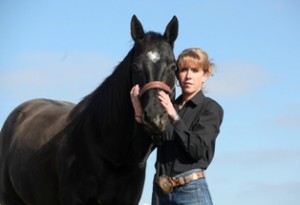St. Louis, Mo. – At a time when so many people in government are working on ways to create jobs, the Missouri Veterinary Medical Board is actively trying to put people out of work. Earlier this week, Mrs. Brooke Gray of Holt, Missouri, announced that she will not be bullied out of the occupation that she loves and that she intends to fight to ensure that the government cannot force citizens to abide by unnecessary and irrational laws.
Brooke is not a veterinarian and she has never pretended to be one. But, as hundreds of horse owners across five states have come to appreciate, she is well-trained and skilled in the practice of “floating” horses’ teeth – a procedure that removes sharp, fang-like points that can cause painful cuts and ulcers in horses’ mouths. Brooke received her initial training at a highly-respected school of equine dentistry and she also did a five-month apprenticeship, perfecting her skills under the guidance of master floaters. She now has seven years of experience in the field and a large group of horse owners eager to take advantage of her talents.
“I’m a lucky, lucky woman,” said Mrs. Gray, “because I get to spend so much time helping these magnificent animals live longer, more comfortable lives. How many people can say that they love their jobs as much as I do?”
According to the state government, however, Brooke is a dangerous criminal. On September 9, 2010, the Attorney General’s office filed a lawsuit accusing Brooke of practicing veterinary medicine without a license. The Veterinary Medical Board, the plaintiff in the case, invoked the authority of a 1992 law that makes it a criminal offense for any non-veterinarian other than an owner or the owner’s full-time employee to change an animal’s physical or mental condition. Violation of the law is punishable by a fine of up to $1,000 and a year in prison for each separate animal involved.
“The breadth of this law is truly astonishing,” said Dave Roland, the attorney who has taken up Mrs. Gray’s defense. “The law offers no exceptions or narrowing definitions, meaning that if it chose to do so, the Board could prevent non-veterinarians from providing such common services as horseshoeing and cattle branding—or even dog grooming and training!”
To become a veterinarian one must attend an approved veterinary school, spending several years and in excess of $100,000 to complete the required course of study. While veterinary schools do offer a great wealth of knowledge and skill in various areas, very few offer students any significant training or experience in floating horses’ teeth. In fact, when veterinarians want learn how to float horses’ teeth, they usually do so at the same sort of school where Brooke received her training.
“I have all the respect in the world for veterinarians,” Brooke said, “but very few of them study or specialize in equine dentistry. Requiring floaters to be licensed vets is like requiring an oil change mechanic to hold a doctorate in engineering.”
Unfortunately, Brooke is learning the hard way that equine dentistry has become a hot issue for veterinarians across the country. With the traditional practitioners out of the way, vets face far less competition and can charge much higher rates for equine dental services. Thus, in recent years regulatory agencies in several states have attempted to shut down floaters so that licensed vets could take over their business. Law enforcement officials in Oklahoma even went so far as to arrest a popular rodeo star, charging him with a felony for agreeing to float horses’ teeth. But that scheme backfired as outrage over the absurd law led the Oklahoma legislature to formally exempt traditional animal husbandry services from the definition of veterinary medicine.
Roland said that the Missouri General Assembly might follow Oklahoma’s lead. “Throughout most of Missouri’s history, farmers and ranchers have had the freedom to make their own choices about who would assist them with basic animal husbandry practices” he explained. “We’re going to fight in the courts and in Jefferson City to make sure that they keep that freedom.”
###

